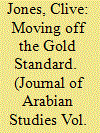| Srl | Item |
| 1 |
ID:
177210


|
|
|
|
|
| Summary/Abstract |
This article analyses the rationale behind the pursuit of nuclear energy by the United Arab Emirates (UAE) and Saudi Arabia, a rationale that is best understood by a particular construct of “stateness”. While the drive towards nuclear energy is justified by a growing demographic, it is also about the projection of prestige which cuts to the very core of regime legitimacy. This in turn feeds into the growing ideational competition between and among the Gulf states and Iran, with nuclear energy increasingly being “securitised” in pursuit of this “stateless”. However, the development of a nuclear programme by Saudi Arabia in particular has come to test the normative frameworks that have hitherto regulated the transfer of nuclear technologies. With regionalism in retreat, and concern over the longer-term commitment of the United States to underpin Gulf security, the development of nuclear energy in the Gulf is leading to a truly “atomised” security complex, the dynamic of which can likely only be controlled on a bespoke basis.
|
|
|
|
|
|
|
|
|
|
|
|
|
|
|
|
| 2 |
ID:
156970


|
|
|
|
|
| Summary/Abstract |
Globalisation and market reforms have made foreign policymaking a more inclusive and multilayered process. Para-diplomacy and emergence of empowered federating/component units engaging in international interaction call for recalibration of theories and understating of International Relations. The debate over central control versus unit autonomy raised the concern: whether para-diplomacy will turn out to be an asset or a threat for the sovereign state. While state may reap benefits of economic development, para-diplomacy may yet lead to regional imbalance, ethnic mobilisation and separatism. With the focus being shifted to Asia with respect to expanding market and sphere of influence, this article analyses the experience of para-diplomacy between India and China as well as of both with the USA. In doing so, reference is drawn to the past experiences of the West to understand how para-diplomacy took root and how is it practised in different contexts. Considering the economic, political and social implications of para-diplomatic practices in specific contexts, the article concludes with an attempt to find out the institutional space it may tread and the policy options it may hold out especially for India.
|
|
|
|
|
|
|
|
|
|
|
|
|
|
|
|